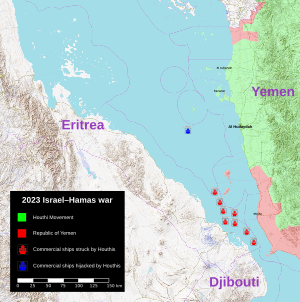Red Sea crisis facts for kids
Quick facts for kids Red Sea crisis |
|||||||
|---|---|---|---|---|---|---|---|
| Part of the Iran–Israel proxy conflict, the Middle Eastern crisis (2023–present), and the Yemeni civil war (2014–present) | |||||||
 Map of Houthi activity near the Yemeni coast: Houthi-controlled Yemen (SPC) Government of Yemen (PLC) Houthi attacks (red) and hijackings (blue) |
|||||||
|
|||||||
| Belligerents | |||||||
Axis of Resistance |
Prosperity Guardian:
Independent Patrols:
|
||||||
| Commanders and leaders | |||||||
|
|
||||||
| Units involved | |||||||
| See order of battle | |||||||
| Strength | |||||||
|
Naval assets:
|
|||||||
| Casualties and losses | |||||||
|
Per Houthis: |
|||||||
| 1 Vietnamese, 3 Filipino sailors killed and 8 injured 2 Israelis civilian killed and at least 177 others injured 1 WFP worker killed 6 Egyptian civilians wounded At least 232 Yemeni civilians killed and 607 injured 1 United Nations worker injured |
|||||||
|
Two ships have been hijacked by Houthi militants; one ship and 25 crew members remain in Houthi custody, while one ship has been released. At least 30 ships have been damaged by Houthi attacks. One UK-owned and one Greek-owned cargo ship sunk.
|
|||||||
The Red Sea crisis (Arabic: أزمة البحر الأحمر) began on 19 October 2023, when the Iran-backed Houthi movement in Yemen launched missiles and armed drones at Israel, demanding an end to the invasion of the Gaza Strip. The Houthis have since seized and launched aerial attacks against dozens of merchant and naval vessels in the Red Sea, drawing hundreds of air strikes on missile sites and other targets by US and allied forces. The crisis is linked to the Gaza war, the Iran–Israel proxy conflict, the Iran–United States proxy conflict, and the Yemeni crisis.
Since 2014, the Houthis, who oppose Yemen's internationally recognized government, have controlled a considerable swath of the country's territory along the Red Sea. Shortly after the outbreak of the Gaza war, the Hamas-allied group began to launch missiles and drones at Israel. It has also fired on merchant vessels in the Red Sea, particularly in the Bab-el-Mandeb—the southern maritime gateway to the Suez Canal of Egypt, creating major losses for the global economy. The group has declared that it will not stop until Israel ceases the Gaza war.
The Houthis say that any Israel-linked ship is a target, including US and UK warships, but they have also indiscriminately attacked the ships of many nations with no connection to Israel. From October 2023 to March 2024, the Houthis attacked more than 60 vessels in the Red Sea. To avoid attack, hundreds of commercial vessels have been rerouted to sail around South Africa.
The Houthis' Red Sea attacks have drawn a military response from a number of countries. In January 2024, the UN Security Council adopted Resolution 2722, condemning the Houthi attacks and affirming freedom of navigation. The United States-led Operation Prosperity Guardian was launched to protect Red Sea shipping. Since 12 January, the US and UK have led coalition air and missile strikes against the Houthis, while other countries are independently patrolling the waters near Yemen, attacking Houthi vessels in the Red Sea. Undaunted, in May, Yemeni Armed Forces Brigadier General Yahya Saree said, "We will target any ships heading to Israeli ports in the Mediterranean Sea in any area we are able to reach".
Impact
Houthi attacks have reduced shipping to Israel and local trade. Insurance costs for commercial ships that go through the Red Sea have increased; some Israeli ships have seen an increase of 250%, and others were unable to get any insurance.
Major shipping companies suspended ship traffic through the Red Sea due to the attacks, including MSC, Maersk, CMA CGM, COSCO, Hapag-Lloyd, and Evergreen Marine Corporation. On 18 December, the British multinational oil and gas company BP also suspended all shipments through the Red Sea.
On 21 December, the CEO of the port of Eilat said the port has seen an 85% drop in activity since the Yemeni attacks on shipping in the Red Sea. Many ships instead took a safer route, going around Africa and the Cape of Good Hope, although this route incurs an extra ten days, spends more fuel, and requires more crew time. The suspension of a large volume of trade through the Red Sea led to a decrease in use of the Suez Canal, and was thus a blow to the Egyptian economy.
Houthi attacks have held up shipments containing vital aid for Sudan and made it more expensive for humanitarian agencies to operate in the country, which has been the site of an ongoing armed conflict that put millions at risk of famine.
See also
 In Spanish: Crisis del mar Rojo para niños
In Spanish: Crisis del mar Rojo para niños

